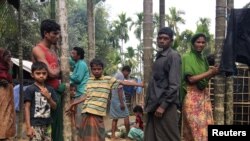U.N. aid agencies are intensifying COVID-19 operations to prevent the spread of the deadly disease in the Rohingya refugee camps in Cox’s Bazar, Bangladesh. The move follows the confirmation of the first case of the coronavirus in the camps Thursday, as well as a second infection in the local Bangladeshi host community.
Aid agencies have been dreading an outbreak of COVID-19 in Rohingya refugee settlements in Bangladesh which, according to the U.N. refugee agency UNHCR, house some 860,000 refugees.
U.N. refugee agency spokesman Andrej Mahecic says there are serious concerns about the potentially severe impact of the coronavirus circulating in the densely populated refugee settlement.
“Another 400,000 Bangladeshis live in the surrounding host communities. These populations are considered to be among the most at risk globally in this pandemic. No effort must be spared if the higher fatality rates are to be avoided in overcrowded sites with limited health and water and sanitation infrastructure,” Mahecic said.
The UNHCR and partners are carrying out a range of preparedness and prevention measures to curb the spread of the disease. For example, aid workers have been trained to teach refugees about COVID-19, how they can protect themselves and how to seek health care if they are ill. Radio spots, videos, posters and messages are being beamed through the camps explaining how the virus spreads.
The UNHCR says efforts are underway to clean and disinfect communal areas and neighborhoods throughout the camps. The agency is also setting up isolation and treatment centers.
Meanwhile, the U.N. Children’s Fund is constructing a 210-bed facility in Cox’s Bazar and providing personal protective equipment for health workers. UNICEF spokeswoman Marixie Mercado says her agency and others are providing safe water and soap supplies for 240,000 Rohingya refugees, over half of whom are children.
“UNICEF partners including WFP (World Food Program) continue to provide screening, treatment and follow up care for acutely malnourished children. 11 percent of Rohingya children under five suffer from acute malnutrition, placing them at heightened risk of medical complications if they contract COVID-19,” she said.
Mercado said UNICEF provides protection, counseling and psychosocial support for children, women and girls, many of whom have been victims of sexual assault. She notes children are at increased risk of violence, exploitation, abuse and neglect.
She said radio broadcasts and cartoons are providing children with information on how to protect themselves against infection, such as frequent hand washing with soap and water, and where to go to seek help.





